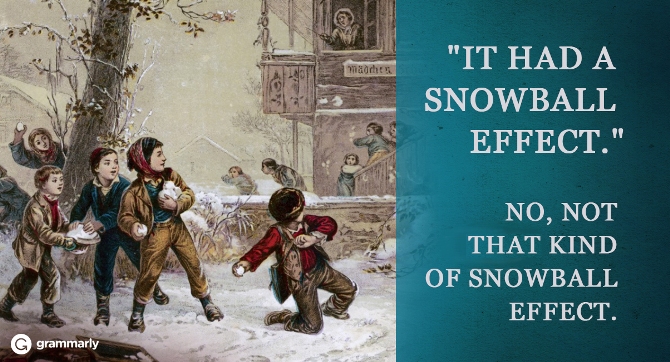
Cold temperatures and wintry weather have long inspired poetry and prose. Perhaps it’s the invigorating chill or the gorgeous sight of freshly fallen snow that brings ideas to the minds of writers. Consider the vast amount of poetry written about the season. In “Dust of Snow,” Robert Frost describes how a dusting of snow knocked down on him from a hemlock tree uplifted his mood “and saved some part of a day [he] rued.” The amazing beauty of a winter sun dazzled Robert Louis Stevenson in “Winter-Time.” Lewis Carroll wondered “if the snow loves the trees and fields, that it kisses them so gently? And then it covers them up snug, you know, with a white quilt; and perhaps it says ‘Go to sleep, darlings, till the summer comes again.’” Perhaps you are not a poet, but you might have used some poetic idioms like “a cold snap” or “in the dead of winter.” What exactly is a cold snap and how did this idiom begin? The etymologies of these winter idioms will intrigue you.
A Cold Snap
A cold snap is a drastic warm-to-cold temperature change. Though this phrase is idiomatic, it isn’t illogical. Snap often describes things that occur rapidly, such as a decision or judgment. Some suggest that snap also refers to the conditions that cold weather produces. When temperatures dip below freezing, some things become brittle. Twigs or grass blades make crackling sounds as they snap under pressure.
Snowbirds
Many species of birds don’t particularly appreciate a cold snap. In winter, they fly south. The bar-tailed godwit travels as far as 7,000 miles in just over a week’s time. Certain humans in northern climates have similarly taken to moving south as the weather turns cooler. Called snowbirds, these travelers often migrate to milder climates in the southern United States, Mexico, or even the Caribbean. Some rent residences in the locale, but others drive motor homes or sail boats. By the dead of winter, you won’t see any snowbirds in the north.
The Dead of Winter
Speaking of the dead of winter, why is this season described so morbidly? You might have also heard of the dead of night. Both idioms refer to the middle of the period. So “the dead of the winter” is the middle of winter, and “the dead of night” is the middle of the night. Meteorologist Tom Skilling describes winter conditions: “In temperate weather zones, winter is a time of lower temperatures and fewer hours of daylight, and a season of hibernation, dormancy or relative inactivity for most living things.” The darkness of night characterizes another period of sleepy inactivity. These time periods share the characteristics of death—inactivity, stillness, silence.
Cold Comfort
Revenge is a dish best served cold. Comfort is not! Macmillan Dictionary defines comfort as someone or something that makes you feel better when you are sad or worried. Cold comfort means little or no comfort. When something makes a situation only slightly better or doesn’t change it at all, you can describe it as cold comfort: The small severance package was cold comfort to the employees who lost their jobs.
To Get Cold Feet
People often use this idiom when someone is making a major life decision. A bride and groom, for instance, may be asked if they’re getting cold feet in the weeks before their wedding day. To get cold feet is to become fearful about how a decision will impact your life. In some cases, the apprehension about a decision makes a person regret making the commitment and decide not to follow through with it. People often console a nervous bride and groom: “Don’t worry! It’s just cold feet.” It’s no cold comfort; the engaged person usually concedes that the anxiety is just normal pre-marriage jitters.
Unless you are an injured athlete or a participant in a polar bear plunge for charity, you won’t want to dive into freezing water. You can, however, use cold weather idioms to express yourself. Whether you stay to enjoy the snow or fly off with a flock of snowbirds, people will enjoy hearing you use these interesting winter idioms. Don’t just use the idioms; explain to your friends what they mean!






